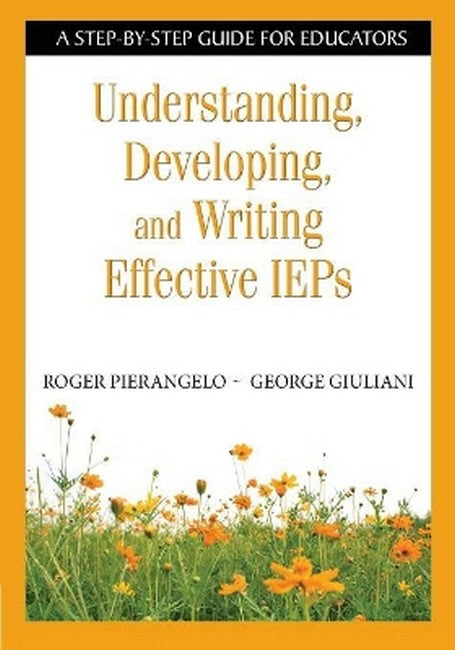Roger Pierangelo is an associate professor in the Department of Special Education and Literacy at Long Island University. He has been an administrator of special education programs and served for eighteen years as a permanent member of Committees on Special Education. He has over thirty years of experience in the public school system as a general education classroom teacher and school psychologist, and is a consultant to numerous private and public schools, PTAs, and SEPTA groups. Pierangelo has also been an evaluator for the New York State Office of Vocational and Rehabilitative Services and a director of a private clinic. He is a New York State licensed clinical psychologist, certified school psychologist, and a Board Certified Diplomate Fellow in Child and Adolescent Psychology and Forensic Psychology. Pierangelo is currently president of The National Association of Special Education Teachers, executive director of The American Academy of Special Education Professionals, and vice-president of The National Association of Parents with Children in Special Education. Pierangelo earned his BS degree from St. John's University, his MS from Queens College, Professional Diploma from Queens College, PhD from Yeshiva University, and Diplomate Fellow in Child and Adolescent Psychology and Forensic Psychology from the International College of Professional Psychology. He is a member of the American Psychological Association, New York State Psychological Association, Nassau County Psychological Association, New York State Union of Teachers, and Phi Delta Kappa. Pierangelo is the coauthor of numerous books, including The Big Book of Special Education Resources and The Step-by-Step Book Series for Special Educators. George Giuliani is an assistant professor at Hofstra University's School of Education and Allied Health and Human Services, in the Department of Counseling, Research, Special Education, and Rehabilitation. He is the executive director of the National Association of Special Education Professionals, president of the National Association of Parents with Children in Special Education (NAPCSE), vice-president of the National Association of Special Education Teachers, and an educational consultant for various school districts. He has provided numerous workshops for parents and teachers on a variety of special education and psychological topics. Giuliani earned Board Certification as a Diplomate Fellow in Child and Adolescent Psychology and Forensic Psychology from the International College of Professional Psychology. Giuliani is also a New York State licensed psychologist, certified school psychologist, and has an extensive private practice focusing on children with special needs. He is a member of the American Psychological Association, New York State Psychological Association, the National Association of School Psychologists, Suffolk County Psychological Association, Psi Chi, American Association of University Professors, and the Council for Exceptional Children. Giuliani earned his BA from the College of the Holy Cross, MS from St. John's University, JD from City University Law School, and PsyD from Rutgers University, The Graduate School of Applied and Professional Psychology. Giuliani is the coauthor of numerous books, including The Big Book of Special Education Resources and The Step-by-Step Book Series for Special Educators.
Request Academic Copy
Please copy the ISBN for submitting review copy form
Description
Preface Acknowledgments About the Authors Introduction 1. Foundational Issues in Individualized Education Programs (IEPs) Introduction Purpose of an IEP 13 Principles of IEP Collaboration 2. IEP Preparation Preparation Before the IEP Meeting Setting Up the IEP Meeting Giving Notice of an IEP Meeting When an IEP Meeting Must Be Convened Helping Students Prepare Characteristics of an Effective IEP Team Meeting 3. IEP Participants IEP Team Members--Roles and Responsibilities Excusal of Team Members Questions and Answers About Other IEP Team-Related Topics 4. IEP Team Meetings The Team Process During the Meeting--Focused but Flexible Guidelines for Running the IEP Meeting 5. Step-by-Step Development of the IEP Step 1: Formulate a Statement of the Student's Present Level of Academic Achievement of Functional Performance Step 2: Determine the Four Need Areas Step 3: Consideration of Special Factors Step 4: Determination of Measurable Annual Goals (Including Academic and Functional Goals) Step 5: Reporting Progress Toward the Annual Goals to Parents Step 6: Determine the Extent to Which the Student Will Not Be Able to Participate in General Education Programs (LRE Explanation) Step 7: Determine Placement Options Step 8: Determine Related Services Step 9: Determine Program Modifications, Accommodations, Supplementary Aids, and Services Step 10: Determine the Need for Assistive Technology Devices and Services Step 11: Determine the Supports for School Personnel on Behalf of the Student Step 12: Determine the Ability of a Student to Participate in State and District Assessments Step 13: Determine Extended School Year (ESY) Services Step 14: A Statement of Secondary Transition Service Needs and Needed Transition Services for Students Step 15: Develop a Statement of Transfer of Parental Rights to the Student Upon Reaching the Age of Majority Annual Review and Revision of the IEP Recommendations Upon Declassification Appendix: Individuals with Disabilities Education Improvement Act of 2004--Section on IEPs (Enrolled as Agreed to or Passed by Both House and Senate) Glossary References and Suggested Readings Index
"The authors tackle an often complex process in an understandable, sequential manner." -- Mary L. Jackson, Resource Teacher

